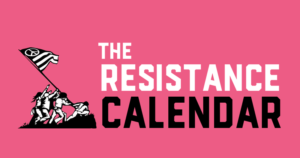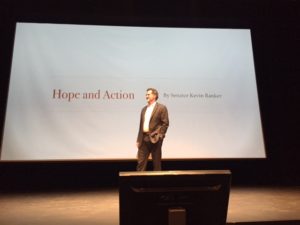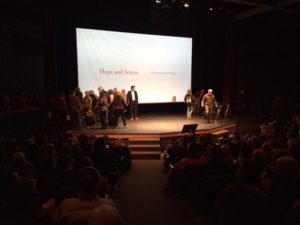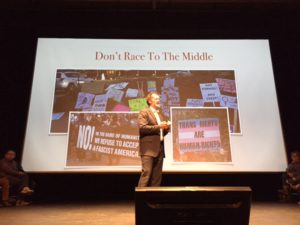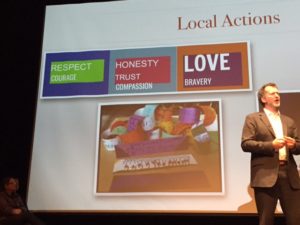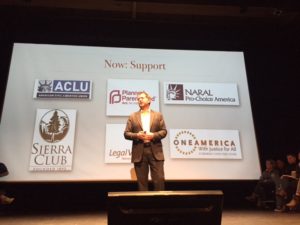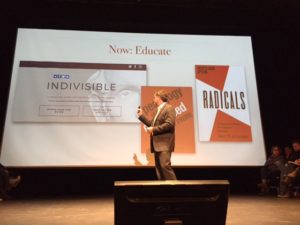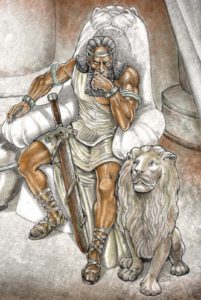We press play. Not pause.
Grassroots meetings and rallies are organizing around the country…community by community…like this one on the San Juan Islands today [2.19.17]. Washington State Senator Kevin Ranker spoke to citizens who want to know what to do now. Who are ready for action and remain hopeful in these days of ‘45’. We want to protect and encourage human rights, not party rights. We are hopeful, and want to take action.
So many people showed up at this meeting today that to comply with fire safety rules, chairs were set up on stage to get folks out of the aisles.
This talk was focused on now. What can we do now.
‘We have to talk about liberating minds as well as liberating society.’ -Angela Davis
The focus of the talk was to keep our country’s core values strong, and to always lead first with love, kindness, and respect.
And we must listen to those who are hurting the most. Yes, our rural citizens need jobs, and all people must be given the right to vote – – these are big issues. Sometimes these larger issues seem overwhelming and impossible when we are daily barraged with backward and hurtful mandates this administration continues to release. Senator Ranker believes the power lies with the states and the people within our states. “States matter.” We must sign up and lobby for what we believe, and most importantly, we get people to vote; even in the context of re-districting and gerrymandering, help people vote. Looking at specific numbers, ‘45’ did not win by a large margin in any demographic. However, many people chose not to vote this election for various reasons. This meeting today was not about why, but what. What can we do now.
Senator Rankor offers three suggestions:
- One Term. We cannot allow eight years of hate. One term. One.
- Educate. Educate ourselves and others on the issues.
- Sign up.
Yes, our rural neighbors need jobs, and many voted for ‘45’ who felt he would get their jobs back in coal and manufacturing. These jobs have been dissipating since the ‘70’s and they’re not coming back – – technology has surpassed the need. Yet, there are industries that are growing, for example, the green industry. These families need opportunities for education. What can we do in our communities to help them? I encourage you to watch three brief reports offered from Frontline on PBS, released this week, that help explain the rural plight. Here are the links.
http://www.pbs.org/wgbh/frontline/article/betting-on-trump-jobs/
http://www.pbs.org/wgbh/frontline/article/betting-on-trump-coal/
http://www.pbs.org/wgbh/frontline/article/betting-on-trump-water/
Our collective hearts break thinking of the disappointment, the discouragement and despair when promises made during the campaign will not be kept – – when jobs do not return.
Choose the organizations to support that align with your beliefs and interests. And educate yourself and families. Go to https://www.indivisibleguide.com and learn how to organize action locally. Read books at your local libraries and book stores, like Paulo Freire’s, Pedagogy of the Oppressed, and Radicals, by Saul Alinsky. Sign up to make phone calls, right from your own homes, or local venues. Talk to people. Face-to-face. Listen. And write letters to Washington DC. Elected officials, according to Senator Rankin, read the hand-written ones.
Most importantly. We must stay strong. When we feel fatigued and overwhelmed, lean on each other in our groups for support and strength. And take time with each other, regardless of political perspective.
And you know what else we can do? Run for a political office, or local school board, or PTA. Lend our our voices, and always, always, our hearts.
I am inspired by this movement across our country. You care. I care. We care.
We can do this.
#persist
#resist
#love
Gilgamesh ’45’
In the Assyrian tale of Gilgamesh, over seven thousand years old, the lost and empty king doesn’t listen to the pain in his heart and so mistakenly declares war on Nature, projecting his pain as something to be conquered in the world.
How many times do we project our pain onto the world, rather than face the emptiness in our heart? How many times have we all been given a sign of what might help us find our way only to smash the sign, out of grief, impatience, or anger?
Projecting our pain, grief, impatience, and anger on others, abdicating our gifts to please a loved one, rejecting new learning because it challenges what is familiar, exiling others because they threaten our position or identity, and denying difficulty in hopes that it will go away – – these are all form of not listening that can undermine our aliveness in any given moment.
-Mark Nepo
Washington Post
All would be well, he said, so long as the people made sure always to elect political leaders who were “wise and good.”
By the time we reach ancient Greece, philosophers like Plato start to offer formal definitions of the tyrannical soul, and the picture is one of the person who defrauds freely, takes violently, lies consistently, robs and kills. Think of ’45’ saying last year about terrorism suspects, “You have to take out their families.” Think of his remark, “I could stand in the middle of Fifth Avenue and shoot somebody, and I wouldn’t lose any voters.”
For many years, I’ve taught Plato’s “Gorgias” and “Republic,” where the tyrannical soul is described. Never did I think we would have a walking, talking example from American politics in front of us 24-7. But here we are. I don’t invoke ’45’ when we discuss passages about the tyrant in those texts. But the comparisons are so obvious that after class my students tend to make small, quiet remarks to me about it.
While the institutions of constitutional democracy were invented to make it easier to rein people in, those who did the work of drafting the Constitution never thought that institutions alone could solve the job. On the cusp of the Constitution’s ratification, founder James Wilson paused to ponder what it would take for the reorganized representative democracy to succeed. All would be well, he said, so long as the people made sure always to elect political leaders who were “wise and good.” The president and other elected officials, he pointed out, would populate the bureaucracies of the new nation. If they themselves were wise and good, they would also populate all the offices of the country with the wise and good. If they were not, then corruption would spread through the entire system.
This election has moved past questions of ideology and partisan position to fundamental elements of the human condition, elements so fundamental that we can find them recorded in the earliest human texts. From the beginning of human history, when tyrannical souls have acquired power, the people have found themselves groaning and crying out with laments under the burden of it.
Character matters because it is how we restrain the inner would-be tyrant in each one of us. It matters because it is how we limit the placement of great power in the hands of those with tyrannical instincts and appetites. If we’ve given up a commitment to character, we’ve already given up the game or, to speak more precisely, the work of protecting freedom, equality and human flourishing.
-Danielle Allen/Political Theorist at Harvard University
